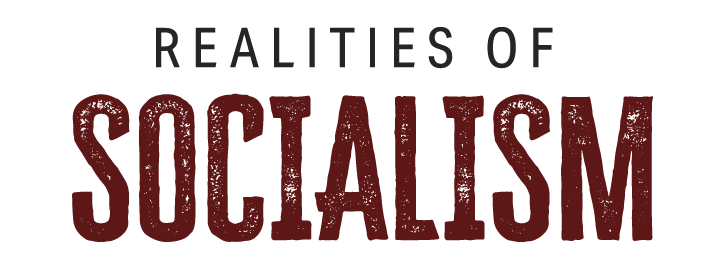Seventeen per cent of Canada’s 18- to 34-year-olds believe communism is the ideal economic system.
Political and economic change is often driven by the young. They have energy, a tolerance for risk, and are less beholden to the status quo. But they don’t always push for new ideas.
Last week in Oakville, a group of high school students set up outside of city hall to promote a very old idea—communism. At a table festooned with the hammer and sickle and piled with literature featuring Lenin’s face, they set about educating anyone who happened by. One such passerby, Alessa Polga, left Venezuela 15 years ago as the country’s socialist leadership was consolidating its power. She recounted her own experience with socialism, telling the students about friends whose property was taken while others were “raped and put in jail.”
About half of Canada’s 18- to 34-year-olds believe socialism is an ideal economic system while 17 per cent agree that the ideal economic system for Canada is communism. If only more of them could chat with Alessa Polga.
The idea of communism was already old when a 47-year-old Lenin boarded a train in Switzerland in 1917 bound for Petrograd to start a worldwide communist revolution. Lenin and his followers understood that the youth were key to the success of their venture. As one communist education theorist put it, “Children, like soft wax, are very malleable and they should be molded into good Communists.” To that end, state classrooms in the USSR featured “Lenin corners”—quasi-religious shrines dedicated to the founder. They looked a bit like the table outside Oakville’s city hall.
The boy scouts were outlawed, replaced with the state-sanctioned Young Pioneers—officially, the “Vladimir Lenin All-Union Pioneer Organization.” As any schoolteacher can attest, young children are apt to share family secrets, and so Pioneers were encouraged to inform on their parents. In 1932, Pavlik Morozov, a Pioneer from the rural village of Gerasimovka, turned his father in to the secret police for conspiring against the state. Soon after, Pavlik was stabbed to death. And though the circumstances of his death have never been clear, the communists were quick to capitalize on it, commissioning plays, songs, poems, operas and biographies lionizing Pavlik, the young hero who prized socialism more than his father.
Children were also useful in coercing false confessions. In the USSR children as young as 12 could be held criminally responsible and were often charged with the “crime” of having a relative in prison. By threatening to arrest, rape or even murder their children, the communist state was able to coerce parents into confessing to crimes they never committed. Many of these false confessors were among the 247,157 citizens murdered in Stalin’s Great Terror.
The communists had another reason to arrest kids—the mass incarceration of adults had created so many orphans that dangerous gangs of children roamed the streets, harassing people for food, committing petty crimes and practising prostitution.
But the youth often drive change. It was the young who mounted the resistance to communism. University students and young workers led the Hungarian uprising in 1956, the Prague Spring in 1968, and the Solidarity hunger protests in Poland in 1981. Each of these revolts against communism was mercilessly crushed.
But the young are not easily cowed. In Czechoslovakia, following the Prague Spring and the Soviet invasion of 1968, a 17-year-old bass player named Milan Hlavsa formed an anti-establishment rock band called “The Plastic People of the Universe.” Though outlawed, the band performed in secret, dodging the police. When band members were finally arrested and put on trial in 1977, several hundred intellectuals signed a petition reminding the communist government that it had agreed to respect human rights in the Helsinki Accords. One of these intellectuals was the poet, playwright and dissident Václav Havel who became, in the words of one historian, “the most influential chronicler of his generation’s disillusionment with communism.”
In time, it was young people who tore down the Berlin Wall, and it was young people who built a new freer society amid the ruins of communism. The Oakville high school students promoting communism have much to learn from the experience of young people who risked their lives to fight for their freedom from communist tyrants.
